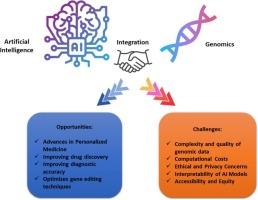The transformative role of Artificial Intelligence in genomics: Opportunities and challenges
IF 0.9
Q4 GENETICS & HEREDITY
引用次数: 0
Abstract
Artificial Intelligence (AI) is poised to revolutionize genomics, offering transformative opportunities while simultaneously presenting significant challenges. This review article explores the multifaceted integration of AI into genomic medicine, highlighting its potential to enhance genomic data analysis, improve disease diagnosis, and enable personalized treatment strategies. We discuss the advancements in machine learning and deep learning techniques that facilitate the identification of genetic variants, optimize genome sequencing, and predict disease outcomes by analyzing vast datasets. Despite these promising developments, the application of AI in genomics faces hurdles such as data quality issues, algorithmic bias, and ethical concerns regarding patient privacy and health disparities. Furthermore, the article addresses the need for robust regulatory frameworks to ensure the safe and effective implementation of AI technologies in clinical settings. By synthesizing current research and emerging applications, we aim to provide a comprehensive overview of the state of AI in genomics, emphasizing both the opportunities for innovation and the challenges that must be navigated to fully realize its potential in advancing genomic medicine.

人工智能在基因组学中的变革作用:机遇与挑战
人工智能(AI)有望彻底改变基因组学,在提供变革性机遇的同时,也带来了重大挑战。这篇综述文章探讨了人工智能与基因组医学的多方面整合,强调了它在增强基因组数据分析、改善疾病诊断和实现个性化治疗策略方面的潜力。我们讨论了机器学习和深度学习技术的进步,这些技术有助于识别遗传变异,优化基因组测序,并通过分析大量数据集预测疾病结果。尽管取得了这些有希望的进展,但人工智能在基因组学中的应用面临着诸如数据质量问题、算法偏见以及有关患者隐私和健康差异的伦理问题等障碍。此外,本文还讨论了建立强有力的监管框架的必要性,以确保在临床环境中安全有效地实施人工智能技术。通过综合当前研究和新兴应用,我们旨在全面概述基因组学中人工智能的现状,强调创新的机遇和必须克服的挑战,以充分发挥其在推进基因组医学方面的潜力。
本文章由计算机程序翻译,如有差异,请以英文原文为准。
求助全文
约1分钟内获得全文
求助全文
来源期刊

Gene Reports
Biochemistry, Genetics and Molecular Biology-Genetics
CiteScore
3.30
自引率
7.70%
发文量
246
审稿时长
49 days
期刊介绍:
Gene Reports publishes papers that focus on the regulation, expression, function and evolution of genes in all biological contexts, including all prokaryotic and eukaryotic organisms, as well as viruses. Gene Reports strives to be a very diverse journal and topics in all fields will be considered for publication. Although not limited to the following, some general topics include: DNA Organization, Replication & Evolution -Focus on genomic DNA (chromosomal organization, comparative genomics, DNA replication, DNA repair, mobile DNA, mitochondrial DNA, chloroplast DNA). Expression & Function - Focus on functional RNAs (microRNAs, tRNAs, rRNAs, mRNA splicing, alternative polyadenylation) Regulation - Focus on processes that mediate gene-read out (epigenetics, chromatin, histone code, transcription, translation, protein degradation). Cell Signaling - Focus on mechanisms that control information flow into the nucleus to control gene expression (kinase and phosphatase pathways controlled by extra-cellular ligands, Wnt, Notch, TGFbeta/BMPs, FGFs, IGFs etc.) Profiling of gene expression and genetic variation - Focus on high throughput approaches (e.g., DeepSeq, ChIP-Seq, Affymetrix microarrays, proteomics) that define gene regulatory circuitry, molecular pathways and protein/protein networks. Genetics - Focus on development in model organisms (e.g., mouse, frog, fruit fly, worm), human genetic variation, population genetics, as well as agricultural and veterinary genetics. Molecular Pathology & Regenerative Medicine - Focus on the deregulation of molecular processes in human diseases and mechanisms supporting regeneration of tissues through pluripotent or multipotent stem cells.
 求助内容:
求助内容: 应助结果提醒方式:
应助结果提醒方式:


